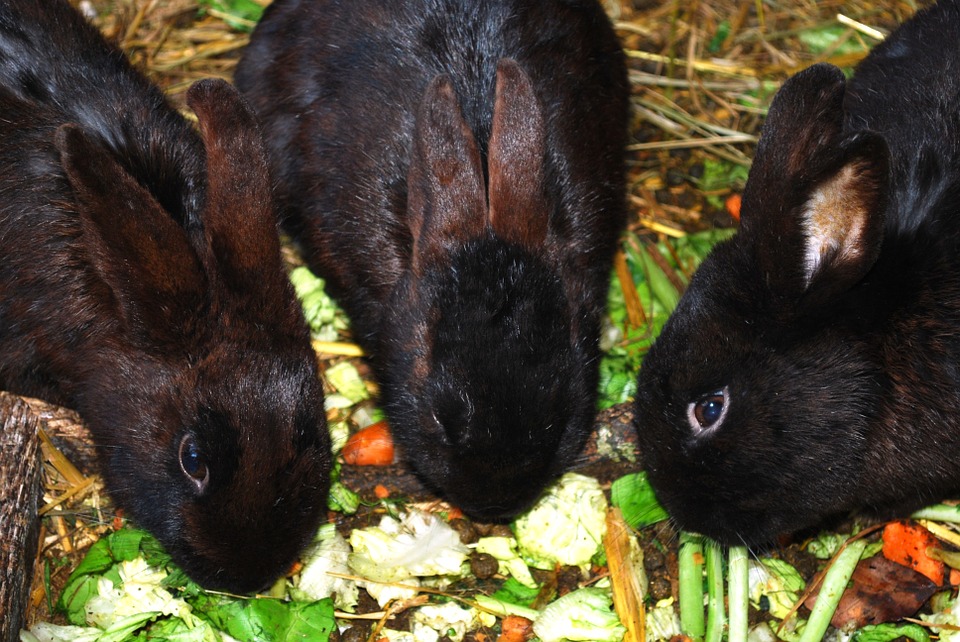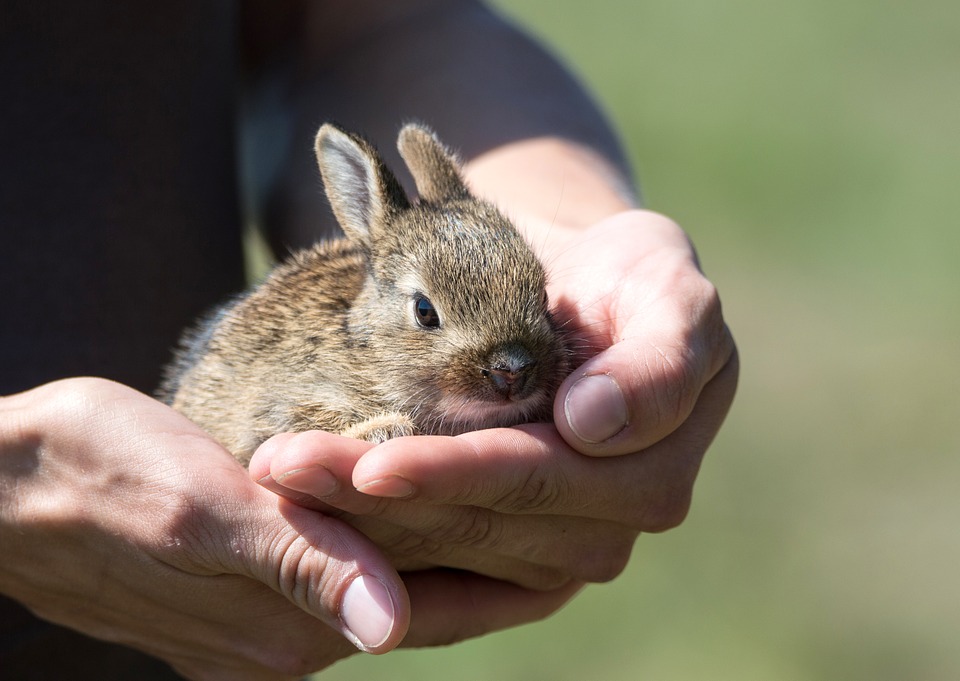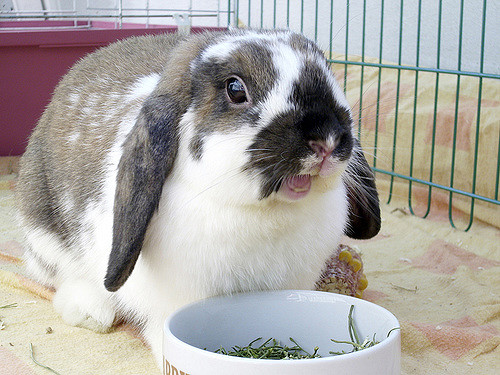
We love rabbits here on Can Pets Eat, so we love fielding questions such as:
- What do Rabbits Eat?
- What Can’t Rabbits Eat?
- What’s Rabbit’s Favorite Food?
- What do Baby Rabbits Eat?
- How Long Can a Rabbit Go Without Food?
- How Long Can Bunnies Go Without Water?
And many more. If we can help you to take better care of your bunnies, then we’re happy. So, to learn what rabbits can eat; what you should feed them; and what you should avoid feeding them, read on! As usual, you can also find way more information on individual foods and food types throughout this site.
What do Rabbits Eat? / What do Bunnies Eat?
So, what should you feed your rabbit (or bunny, as any long-term owners take to calling them)?
Well, the most important part of any rabbit’s diet is hay. A good quality hay is essential and it should be on hand at all times. They can’t really overfeed on this and they need it to stay healthy. It helps to complete the digestive process and it is an essential component of any rabbit’s diet.
In fact, it should make up more than 70% of their diet. You can also add some foraging materials to the mix, such as a little grass or dried leaves. These should be spilled in smaller doses along with the hay. Don’t grab any old leaves from the garden though. Only buy mixes specifically designed for rabbits, as there are a lot of harmful and even deadly leaves and flowers for rabbits.
Pellets should also be fed to your rabbit. They get a bad rep, but the truth is there is nothing wrong with them if they compose a small part of the diet. In fact, most pellets consist of leaves and hay anyway, so it’s perfectly fine. The one thing you should avoid giving them is muesli. This is marketed as rabbit food and is quite common, but it’s not healthy.
Muesli mixes do provide a balance diet, but as any rabbit owner will tell you, our little furry and floppy-eared friends are always very selective. They pick the unhealthy parts and leave the rest, which means they never get a balanced diet.
The remainder of the diet should be the occasional treat. A little fruit. A little vegetable. Nothing too sweet, nothing in high doses. If you keep reading to the bottom of this article you’ll find a secret Favorite Food that all rabbits love and is perfectly healthy in small doses.
What Else do Rabbits Eat?
That’s pretty much it. Just make sure you forgo the things that can do harm (discussed below) and that they have a constant supply of fresh hay. If you don’t like dealing with the mess of hay then get hay cubes instead. Not all rabbits enjoy them as much, but some like them even more. They are simply compressed cubes of hay.
Your rabbit should also always have a constant supply of fresh water. We can’t stress this enough. One of the main reasons for unhealthy pet rabbits is dirty or rancid water. The RSPCA have previously listed this as the main reason that rabbits are mistreated as pets. That’s because many owners just fill a water bottle and then add more when it has been drunk.
But this means that your rabbit can be drinking water that is a couple days old. Would you want to drink water that has been sitting out in the open for two days? I don’t think so.
So, make sure they get fresh water every day. One of the best ways to ensure you do this is to get rid of the bottle and get a bowl instead. You can get a bowl that attaches to the cage so they don’t knock it over. This will run out every day, which means you will be prompted to refill it every day as well.
Not only does it mean fresh water, but bunnies prefer drinking from bowls. Most bunnies hate drinking from water bottles and often dehydrate intentionally because they dislike it so much.
What Can’t Rabbits Eat?

The first thing we should stress is that carrots should not be the main source of food for a rabbit. They are high in sugar and should be a treat only. This applies to any other veg and fruit, especially lettuce.
Rabbits should also avoid potato, cabbage and parsnips. Some of these are okay in small doses. However, they contain high levels of oxalic acid, which is bad for bunnies. There are also foods that can cause digestive problems, blood disorders and other issues.
Here is a brief list of foods that rabbits can’t eat. But bear in mind that there are more foods out there:
- Onions
- Leeks
- Chives
- Tomato Leaves
- Swedes
Grasses and Flowers that Rabbits Can’t Eat
If you plan to let you rabbit run free in your garden then you should be aware of what plants will surround it. In all cases, you should avoid letting a baby rabbit run free as it can consume too much grass and essentially overfeed. But all rabbits, regardless of age, need to stay away from the following:
- Lilies
- Buttercups
- Bluebells
- Clover
- Daffodils
- Fairy Primrose
- Honeysuckle
- Iris
- Ivy
- Jasmine
- Larkspur
- Poppies
- Primulas
- Snowdrops
- Tulips
You can find details on lots of different foods on this site. We will tell you whether a rabbit can or can not eat them. But to give you an idea of what you should look out for, use the information above.
What do Wild Rabbits Eat?
Your pet rabbit will subsist primarily on a diet of straw, with some pellets and some veg and fruit thrown in. It’s much the same for a wild rabbit. The difference is that they will eat fresh grass instead of straw. They are grazers, so they will also consume whatever is available.
In the wild, this can lead to problems with poisoning, but wild rabbits tend to be a little smarter and more aware than pet rabbits.
What do Baby Rabbits Eat?
Baby rabbits have very sensitive stomaches. They need to avoid overeating; eating too much sugar; eating anything that can cause digestive stress; and consuming food designed for adult rabbits.
There is a reason that there are adult and baby rabbit food mixes on the market. It’s not just a marketing ploy designed to get more money from you. They really do need different foods and different levels of care. So, pay attention to the labels on the food and always do that extra bit of diligence when looking for foods for your baby bunny.
Avoid feeding any amount of lettuce or cabbage to a baby rabbit and avoid everything we have mentioned in the above section on What Can’t Rabbits Eat, even in small doses. Focus on hay and pellets designed for baby rabbits. That’s it. You can feed them the occasional treat if you want, but just make sure that it won’t do them any harm.
Rabbits Favorite Food?

So, what’s a rabbit’s favorite food? Well, we couldn’t ask rabbits directly (they don’t speak human) but as rabbit owners we have a fairly good idea of what they like. It seems like nothing gets a rabbit’s nose sniffing as much as lettuce. This is a treat that all rabbits love, but it’s one that they can’t consume too much of.
Lettuce might be a health food to a human, but to a rabbit it can be harmful. That’s because there are a lot of empty calories in that lettuce, a lot of water and carbs and very little goodness. Carrots are a little better, but it’s not unusual for rabbits to turn their noses up at these. Fruits are also popular with rabbits.
This applies to fresh fruit as well as to dried fruit chips like apple and banana. These are high in sugar so they should be used sparingly, but most rabbits love them. There is also one treat that all rabbits love, at least in our experience. That treat is Locust Beans. These funny-looking and nasty smelling things are unpleasant to all human senses, but bunnies love them.
What’s more, they are cheap, easy to find, and not as unhealthy as many other bunny treats. So, if you want to surprise your bunny with something different and something delicious, try locust beans. It might just become your rabbit’s favorite food.
As with humans, a rabbit’s favorite food is not necessarily the best one for it. So, don’t read too much into this. Just think of lettuce, carrots and fruits as bunny pizza!
Can Rabbits Eat Cat Food?
Okay, we get why you would want to ask this of dogs, but rabbits? Surely you don’t need us to tell you that this is a huge, head-shaking NO! Rabbits are not carnivores. They do not eat meat or fish, which is predominantly what cat food consists of. We have heard of pica cats eating rabbit treats and rabbit food, but not the other way around.
So, keep your bunnies away from cat food. They probably won’t eat it and they certainly shouldn’t be eating it.
How Long Can a Rabbit Go Without Food?
Really, you should avoid leaving your rabbit for longer than 12 hours without food, and no more than 48 hours at the most. They have very sensitive digestive systems.
It always worries us when people ask how long a rabbit can go without food, but there are innocent reasons to ask this. You might have just run out of your usual rabbit food, for instance. If this is the case then this article can point you towards human foods that they can eat until the food arrives or you pick it up.
Just bear in mind that they shouldn’t be eating like this for too long. Several times over the years we have run out of rabbit food for a couple days and have resorted to feeding them vegetables and fruits. We have been very careful, but on each occasion at least 1 rabbit in the household has had digestive distress as a result.
They have all made it through eventually, but it’s still a worry when your rabbit is unwell.
How Long Can a Rabbit Go Without Water?
A rabbit can survive 24 hours without water. However, fresh water should always be supplied. If your rabbit is not drinking, check the bottle to make sure it works. You should also consider placing a small bowl or cup of water in the cage. If they still won’t drink enough water and this is causing problems (such as a calcium build-up) then add something sweet to the water.
You can buy drops that contain natural extracts. You can also just add a teaspoon of unsweetened, natural carrot juice to the water.